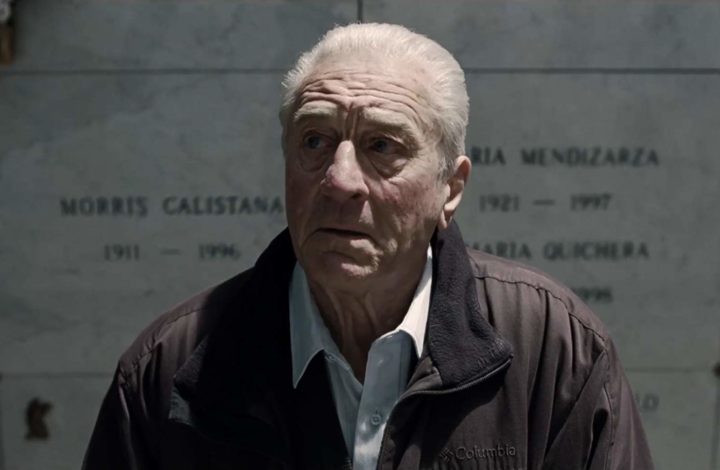
MPAA Rating: R | Rating: ★★★★½
Release year: 2019
Genre: Biography, Crime, Drama Director: Martin Scorsese
A cinematic memento mori, The Irishman (aka I Heard You Paint Houses) is one of Martin Scorsese’s all-time greatest films. Rich with Catholicity and elegiac in tone, Scorsese both celebrates and deconstructs the mobster crime genre he’s well-known for due to Mean Streets, Goodfellas, Casino, and The Departed. Yet there are also nods to Taxi Driver, The Age of Innocence, and even Silence in the film’s determined focus of an end-of-life meditation on the inevitability of death. Indeed, I’m willing to call The Irishman the natural culmination, the magnum opus, of Scorsese’s entire cinematic oeuvre—everything else has been leading up to this film. It feels like a eulogy.
The Irishman‘s long opening tracking shot weaves not through the Copacobana, but a nursing home where aging former hitman Frank “Irishman” Sheeran narrates his story of rising in the Bufalino mafia due to his friendship with Russell Bufalino (Joe Pesci) and his supposed involvement with the disappearance of Jimmy Hoffa (Al Pacino). The shift from voiceover narration to Frank’s diegetic retelling of his story sets the tone right from the beginning: Frank’s story is Frank’s story, a subjective remembering of the past which he’s confessing it to anyone who will listen (except for the FBI, of course). From his years fighting in Italy during WWII, to driving a truck and his involvement with the Teamsters, to his rise via Bufalino to Hoffa’s right-hand man, the first two hours of Sheeran’s tale feel like signature Scorsese, even a pastiche of Goodfellas and Casino. But Scorsese patiently draws the story out for more than 90 more minutes, which invites fresh reconsiderations of details from earlier scenes even as it arrives at an affecting, haunting conclusion.
Much has been made of the de-aging CGI effects which digitally turn back the clock on the 76-year-old De Niro’s aging face, giving it an odd youthful sheen. While I typically decry CGI like this, it feels deliberate here in the capable hands of Scorsese, and absolutely works on the narrative level as an aesthetic way of depicting the commemorative aspects of the narration—Frank is remembering all of this for us, so his memories may have a glorified glow to them, imaginatively transforming his present-day geriatric body into a youthful one, even as he is still hampered by the stiff gait of age within his own memories. This is Scorsese skillfully sculpting in time and memory with these iconic actors. Some of these feel familiar; De Niro and Pesci have worked together with Scorsese, although I would argue that this might be their best work together (especially Pesci; he’s incredible here). I was surprised to realize that Pacino and Scorsese hadn’t worked together before, but I’m glad they are here, as this is one of Pacino’s strongest performances in years, demonstrating his range while also showing the restraint which comes with maturity. Anna Paquin also gives an exemplary performance as Sheeran’s daughter; her silence is deafening throughout the film, a spirit of moral goodness and a conscience for Sheeran and his pals. I was also struck by a brief late scene shared between De Niro and Marin Ireland as another of Sheeran’s daughters, where he is finally coming to terms with the life he’s led. Her posture and line readings are heartbreakingly good, poignant without becoming overly sentimental, and I found myself overwhelmed by tears (an experience which happened more than once during the film’s final hour). Between The Irishman and Light from Light, Ireland is an actress I will be paying more attention to, and hope she’s given more roles to express the evident talent she has.
I said The Irishman is “rich with Catholicity,” which could be a description of any of Scorsese’s films. Yet this film feels saturated by Catholic sacramentality, dripping with spirituality: from the sharing of bread and wine between Sheeran and Bufalino, to the liturgy of throwing away guns in a river, to Hoffa’s hubris and pride before the fall, to Bufalino’s final line about “I’m going to church,” there’s not a single scene which doesn’t feel God-haunted somehow. Mournful, meditative, and magnificent, Scorsese via The Irishman once again demonstrates the innate religiosity of cinema, that most transcendent of contemporary cultural forms. As I wrote in my essay on Silence from earlier this year, in the Church of Cinema, Scorsese is our priest.
IMDB Listing: https://www.imdb.com/title/tt1302006/
Leave a Reply